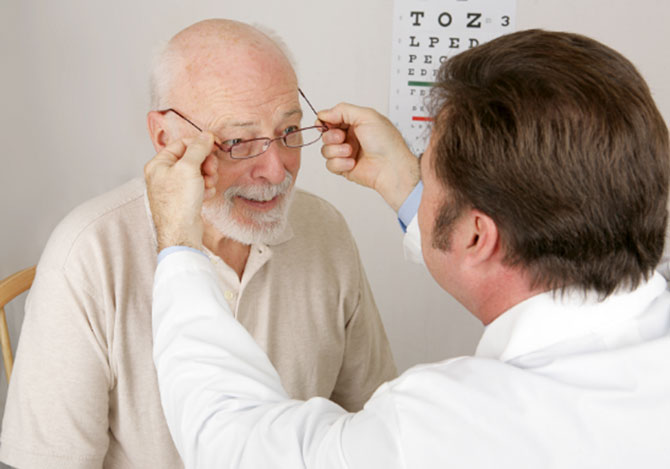
Have you ever thought what life would be if you cannot see?
Maybe you haven’t. Maybe you treat your eyes on “as-need” basis. That as long as you wake up each morning to a burst of colors, you need not care for them.
You’re wrong. Your eyes are as important, if not more important, than all your other senses and taking good care of them should be a part of your health and fitness agenda.
Here’s why…
1. You lose much of your perception of the world around you if you cannot see. In fact, the eyes are responsible for creating 80% of all your impressions on any given day. You can lose your sense of touch, taste, smell, and hearing yet remain safe as long as you have perfect vision.
2. Failure to take care of your eyes can lead to serious age-related eye diseases like glaucoma, cataract, macular degeneration and diabetic retinopathy – the major reasons for blindness among seniors.
Skeptical?
Well, statistics show that two-thirds of legally blind Americans are people 65 years old and above.
The saying, “The eyes are the windows to your soul,” is not a hyperbole. Aside from providing a deep connection with another person, the eyes are also vital in viewing the world around you. They allow you to connect with your surroundings, keep you safe, and help maintain a sharp mind.
Yet you pay them not much attention until you can hardly read your favorite newspaper, or squint your eyes to enjoy your favorite TV show.
As vital as they are, however, they deteriorate as you grow older. This happens around age 40 (I started wearing reading glasses at 45). The rate of deterioration varies among people and is dependent on genetics, surroundings, state of health and the care given them.
Eye care is not a difficult task. In fact, it can be as simple as any of your personal health regimen.
Like the following:
1. A regular eye checkup:
A regular eye checkup is helpful in two ways: First, to check if your glasses are still effective and, Second, to spot potential eye problems before they get worse.
I had one early this year. It resulted to a prescription for eye drops for “dry eyes.” The doctor also told me that I had a slight cataract in my left eye but it is not a cause for worry at present.
2. Use the right lenses:
When I had my first reading glasses, my optometrist told me to have an upgrade each year. She was overly-cautious. I upgrade between four to five years.
For obvious reasons, have your glasses regularly checked to make sure they are still suitable for use.
Wrong lenses cause headaches, makes reading difficult and raises the risk of falls and other accidents.
3. Eat well:
Eating well means foods that satisfy both your physical and mental nourishment needs. A shortfall in one area can affect the whole.
Remember, you cannot be over-nourished. For the eyes, make these a part of your daily diet:
– Green leafy vegetables like spinach, kale, and collards;
– Oily fish like salmon and tuna;
– Non-meat protein sources like eggs, nuts, and beans;
– Citrus fruits and juices.
4. Exercise:
Exercise promotes good circulation and oxygen intake – both important, not only for your entire body but for your eyes as well.
WebMD has a few eye exercises you can do with ease.
5. Get enough sleep:
When you’re asleep your eyes are constantly lubricated, washing away dust or smoke that may have accumulated during the day.
Not only that. Enough sleep slows down cognitive decline and gives your eyes and brain some rest.
6. Keep a healthy weight:
A healthy weight is indicated by Body Mass Index (BMI), a ratio of height and weight.
Keeping an ideal BMI is essential to minimize the risk of high blood pressure, high cholesterol, heart diseases and diabetes – the major cause of blinding diabetic retinopathy.
7. Have enough illumination:
A guy at 60 needs three times as much light as that of a guy in his 20s. Therefore, don’t skimp on lights. You need it.
Keep your home well-lighted especially the stair landings, living room, kitchen, and bathroom.
To promote better sleep, use soft light in your bedroom. If you read before you sleep, make sure your lamp illuminates the page at an angle to avoid harmful glare.
8. Use eye protection outdoors:
Strong sunlight can damage your eyes and may increase your risk of cataracts. So when outdoors, use sunglasses with built-in UV filter.
9. Quit smoking:
We all know that smoking is associated with lung cancer. But do you know that smoking can also lead to vision problems and even blindness?
Yes, studies have shown that smoking increases the risk of age-related macular degeneration, cataracts, glaucoma, dry eye syndrome and diabetic retinopathy.
The eyes are the most important of all your sense organs. It is through the eyes that you can see and appreciate the world around you, make impressions and learn. They add color to your life.
The irony is that we are not as caring of it compared to the attention we give to our six-pack abs or that awesome 36-29-38 vital statistics.
So get on it now before the world around you get dim, dimmer and dark.
Please share with others so they may see the light.
Image: https://seniorsforseniors.ca/wellness-wednesdays-eye-care
~oOo~